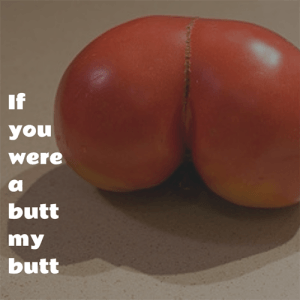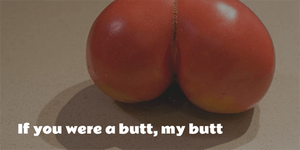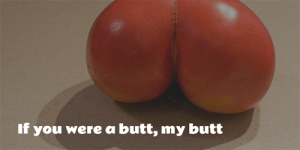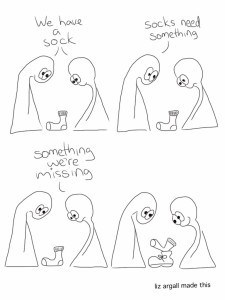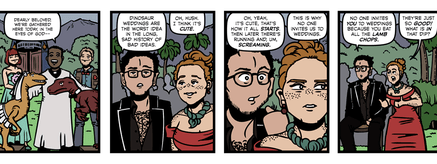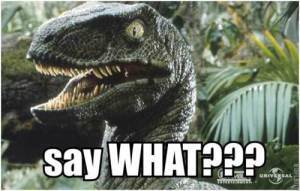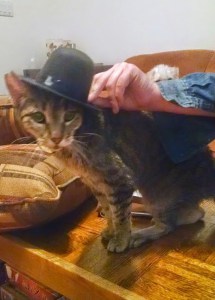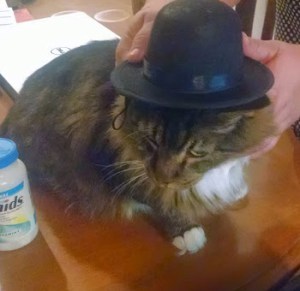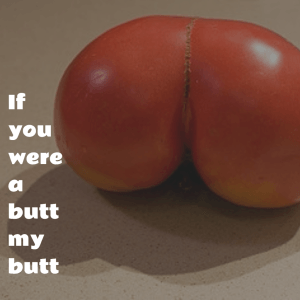Rachel Swirsky's Blog, page 20
May 24, 2016
Yay for Round Robin Dinosaurs! And new stretch goals: Greg Machlin and John Hodgman!
Originally published at Rachel Swirsky. You can comment here or there.
Iiiiit’s time for an “If You Were a Butt, My Butt” update!
(By the way, that’s a tomato. If you’re at work, Liz Argall suggests that just in case you’re worried, you exclaim, “It’s a culinary vegetable!” whenever anyone passes by.)
Kermit arms and confetti! We reached the $600 stretch goal. Now I can continue to usher forth into the world the terrible brainchild that is the round robin short story about dinosaurs currently being written by me, Brooke Bolander, Adam-Troy Castro, John Chu, Alexandra Erin, Ann Leckie, Ken Liu, Juliette Wade, and Alyssa Wong!
Aaaaaaaaaaaaand we’re halfway to $700! Mary Robinette Kowal, of the sultry tweet-reading voice, will narrate the audio book if we hit the stretch goal, and I personally think that would be hilarious so I hope it happens.
At $800, Barry Deutsch will create original cover art — but skipping over him for a moment, because I have new announcements for the later stretch goals:
At $850, Greg Machlin will contribute EVEN MORE SATIRE with an essay detailing his argument that I, personally, have DESTROYED SCIENCE FICTION. (Confession: I had help.)
Have you ever wondered what it would be like if John Hodgman wrote a science fiction story? In a way, we could call that the first fiction authored by an artificial intelligence (because he’s a P.C…. thank you, I’ll see myself out). At this year’s Nebula banquet, John Hodgman proposed three science fiction concepts he felt SFWAns should get on writing.
If I can find a copy of his speech (I’m trying!) then at $900, I will be that SFWAn for one of his prompts. At $950, what the heck–I’ll just do all three.
And if we hit $1000, I will hire someone to make a professional, pretty package out of the whole thing, so that my poor subscribers are not burdened by my technologically unsophisticated hands.
I know that’s a long way to go — but what the heck, why not go for it, right? There’s nothing to lose, and only ridiculous things inspired by John Hodgman to gain.
What should I have titled this essay? (Thoughts on John Joseph Adams’ “Zen in the Art of
Originally published at Rachel Swirsky. You can comment here or there.
John Joseph Adams recently published an article, “Zen in the Art of Short Fiction Titling,” in the SFWA Bulletin.
As someone who hates coming up with titles, I was excited to see what he had to say. So I thought I’d write up some impressions on his article which I’m illustrating with some examples from my own work.
Titles That Come From the Text
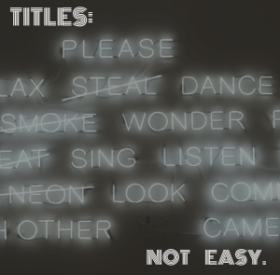 John starts the article by noting several titles that he suggested to authors that he’s published in his magazines and anthologies. He discovered these titles “right there in the text of the stories themselves. When I’m reading or editing a story, I frequently highlight evocative phrases I come across that I can later suggest to the author as a possible alternate title. Sometimes the phrasing isn’t quite right for the title, but it’s something that can be massaged, or combined together with another phrase from elsewhere in the story, that somehow captures the essence of what the story is about.”
John starts the article by noting several titles that he suggested to authors that he’s published in his magazines and anthologies. He discovered these titles “right there in the text of the stories themselves. When I’m reading or editing a story, I frequently highlight evocative phrases I come across that I can later suggest to the author as a possible alternate title. Sometimes the phrasing isn’t quite right for the title, but it’s something that can be massaged, or combined together with another phrase from elsewhere in the story, that somehow captures the essence of what the story is about.”
I used to do the large majority of my titling this way until I started my MFA program at Mills, where the teacher told me what John Joseph Adams brings up next: “I should note that some writing professors—including notable literary giants—advise against this practice, largely because, they say, doing this puts too much emphasis and meaning on the eponymous phrase when the reader comes across it in the story.” I actually wonder whether I’m the one who called this to his attention — we were on a panel about titles together a few years ago, and I brought that up.
As John points out in the article, whether or not this works is a case-by-case thing. In general, I think I’m happier if the phrase would be marked anyway — for instance, if it’s part of a lyric one of the characters sings, or the title of a movie that exists in the text. (My story “The Sea of Trees” refers to a commonly used poetic name for the setting.) John brings up a short story that uses its last line, but I’d argue that’s a phrase that would be marked anyway.
A few years ago, I published a story called “Beyond the Naked Eye” in anthology of John’s, Oz Reimagined. That’s a phrase that appears in the story a number of times; seeing what’s beyond the naked eye is one of the character’s obsessions. Because of that, it’s already marked. Also, I like the title because it also implies there are things beyond the naked eye going on in the story in more than the literal sense.
Sometimes, you can pull a phrase out for the title, and then change the text of the story so that it’s no longer exactly the same. One of my recent stories is called “Love Is Never Still” — that’s not a line I used in any of the poetic sequences, but it could have been, and I could have changed the text later.
And I don’t mean to suggest the technique never works without any of those tricks. I’m sure it does, with finesse and luck. You just need to find a phrase or sentence that can bear the weight of also being a title without becoming a sledgehammer. Finding the right balance can be tricky.
That said, this really is the easiest way to come up with titles. And it’s nice when you’re stuck coming up with something, because it gives you clear steps for proceeding.
Short Can be Good
John brings up the title of Chuck Pahlaniuk’s horror story “Guts” as an example of short titles that work really well. In this case, “Guts” creates a sense of foreboding, building tension before the story even begins.
I really, really like one word titles. I feel like a single word can be sort of delicious to imagine. That sounds kind of absract and new agey, but I mean it literally. When I think of the word “Dust” — when I just let it settle in my head — it has a whole rich dimensions of sensory associations. “Dust” is a word that seems like it should settle, silent and alone, without a lot of fanfare or accompaniment.
But it’s not a great short story title. It is, in fact, first on the list of most common short story titles that were submitted to Clarkesworld (as of when they last ran statistics). Use the title “Dust” and, like a grain of dust, it becomes an anonymous one of many.
One-word titles are probably my weakness. My preference for them is not echoed by most people, especially most writers and publishers at the moment (at least in short stories). I also sometimes use them when I’m lazy and can’t think of what else to do. As a consequence, I have a number of them, especially recently. I hope some are in “Guts” territory, but probably some of them are more like “Dust.”
Looking at the two I published most recently:
“Endless” — I suspect this of being a Dust-like title. It refers to something that is endless, but doesn’t do a lot of work with mood or extra dimension. It rests on the hope that the word is intriguing. (Also, “The End” turns up as one of the 7th most common Clarkeworld titles, although hopefully “EndLESS” would be a little less ubiquitous.)
“Tender” — Hopefully this is more like “Guts.” The story is painful, and the title suggests what follows.
Some of my others: Decomposition, Memorium, Exodus, Extremes, Heartstrung, Silence, Skyscrapers. I continue to believe that “Decomposition” was the correct title for that story, and “Heartstrung” worked well. The others were probably lazy.
Specialized Terminology
From John’s article: “If your story deals with a particular field, with its own unique terminology, you can also mine that for story titles.”
This is one of my favorite techniques. It’s usually specific and evocative, if you find the right way to do it. Like reading through your story to find a title already in it, this technique also gives you some clear directions on how to proceed when you’re stuck. I usually look up online glossaries.
My preference is to find terminology that will work on two levels, e.g. “Grand Jete” — both the leap in ballet, and a reference to the leap into death.
References
John again: “You can also title your story by referencing another work, or borrowing an evocative phrase that is applicable to your own story.”
I do this, but have started doing it less, and making sure what I’m referencing is older. “Dispersed by the Sun, Melting in the Wind” is a reference to a contemporary Israeli poem, and I probably wouldn’t use it now for that reason. Whereas “What Lies at the Edge of a Petal Is Love” is a riff on William Carlos Williams, and “Between Dragons and Their Wrath” references Shakespeare.
John adds that, “You can even “borrow” more directly and just reuse an exact title another author has already used,” and then lists several examples. That works if you have a particular fictional conversation you readers to be thinking of, I guess, but it seems to me like it’s a specialized use.
Also, the Clarkesworld List
I found the Clarkesworld list really interesting, and I think I’ll look at it in another post.
In Sum
I use several techniques John doesn’t list here. Most of us probably have our own idiosyncratic strategies. I liked the article, especially its practical approach.
The real question is: what should I have titled this essay?
May 23, 2016
Butt My Butt Update: Guest Post on Ann Leckie’s Blog, New Rewards from Alexandra Erin & W
Originally published at Rachel Swirsky. You can comment here or there.
Ann Leckie was kind enough to let me borrow her blog to chat about ignoring bullies — how it didn’t work in elementary school, and continues not to work now.
My Making Lemons into Jokes campaign (details here) to retaliate against harassment by raising money for LGBTQ healthcare is doing great! We’re really close to the $600 stretch goal. Speaking of which, I have an announcement.
At $600, several other authors and I are going to write a round robin short story about dinosaurs. I’m excited to announce that Alexandra Erin is joining us! So, the current author list is: me, Brooke Bolander, John Chu, Adam-Troy Castro, Alexandra Erin, Ann Leckie, Ken Liu, Juliette Wade, and Alyssa Wong!
And another announcement — at $700, Mary Robinette Kowal will record the audio book of “If You Were a Butt, My Butt.” AND now National Book Award winner Will Alexander will also record, “If You Were a Cuttlefish, My Love.”
As I’ve previously announced, graphic novelist Barry Deutsch will create an original piece of cover art at $800, and I have something in the works for $900, too… announcement to come…
May 20, 2016
“If You Were a Butt, My Butt” — the Embuttening
Originally published at Rachel Swirsky. You can comment here or there.
Yay! Thanks to everyone who has participated so far in the Making Lemons into Jokes campaign for me to write “If You Were a Butt, My Butt.” (Full story here.)
For the $500 stretch goal, Liz Argall will be creating a brand new Things Without Arms and Without Legs (and presumably butts).
Just a reminder about the upcoming stretch goals — At $600, Brooke Bolander, Adam-Troy Castro, John Chu, Ken Liu, Ann Leckie, Juliette Wade, Alyssa Wong, and I, will write a round robin story about dinosaurs.
At $700, Mary Robinette Kowal will record the audio book.
At $800, Barry Deutsch will create original cover art.
I have a few more things in the works, too!
Since we reached $500 before Monday, I have promised to release the beginning of “Butts.” And here it is:
If you were a butt, my butt, then you would be a butt. This is a tautology, but it’s still true.
Since you are a butt, my butt—being a butt—I regret to inform you that the set of duties you perform are not always tidy or delicate. To begin, you are frequently sat upon, which most people object to—if you doubt me, try it on the subway sometime. Secondly, you are on a not-infrequent basis required to be an excretory passage.
Being an excretory passage may be erotic for some butts—but you are not that kind of butt, my butt, because feces are really gross.
Frankly, I’m surprised you need an orientation. You have been my butt for thirty-four years. You should have a handle on it by now.
#
A digression aimed at my esteemed readers:
By far the most difficult part of this enterprise is that the framework requires metafictional authorial insertion.
(Yes, I said insertion. Let’s face it. Everything from the title forward is going to be riddled with double entendres.)
Luckily, I live a strange and magical life, as I have documented before. For instance, there is my familial relationship with the phoenix as documented in Dr. Thackery T. Lambshead’s Cabinet of Curiosities. Also, I have written of my journeys with the guidance counselor, a time traveling madman who pilots a milk crate.
My shield for these stories is the fact that readers will assume my accounts are fictional. After all, I am a short story writer. Why not believe I am making things up? Probably, you should. Yes.
Everything from this point on is fake. Believe at your own peril.
Friday Read! “The Migratory Patterns of Dancers” by Katherine Sparrow
Originally published at Rachel Swirsky. You can comment here or there.
In a future where birds are extinct, genetically modified men take their motorcycles around the country to perform dances that remind people of the migrations that once took place.
Katherine Sparrow is one of my classmates from Clarion West 2005, and I’ve been a fan of her work ever since. In addition to her lovely and lyrical short stories, she also writes young adult novels which center on the theme of collective action. These days, she’s publishing urban fantasy on Amazon (though I must admit I haven’t read it — sorry, Katie!). Katie also conducted my wedding so I admit I’m rather partial to her.
May 19, 2016
Butt My Butt Update: John Chu and Adam-Troy Castro join the $600 stretch goal!
Originally published at Rachel Swirsky. You can comment here or there.
Thanks to everyone who’s supporting my Make Lemons into Jokes campaign! For those coming upon it for the first time, here’s my explanation of what it is and why I’m doing it. (Short version: A bigot is using the Hugo Awards to harass me and LGBTQ people, so fuck him. Let’s follow the Scalzi strategy–and raise money for something he hates. In this case, Lyon-Martin health services for LGBTQ folks.)
We have achieved the $400 stretch goal: “If You Were a Cuttlefish, My Love.” I showed it to Mary Robinette Kowal and a few other folks, and she gave me an unintentional blurb: “I LOVE THIS WITH THE LOVE OF A THOUSAND CUTTLEFISH EGGS.” I hope y’all enjoy it, too!
We’re partyway to the $500 stretch goal when Liz Argall will make an original comic in her series… Things Without Arms and Without Legs… and Without Butts?
And I’m thrilled to announce that John Chu and Adam-Troy Castro will be joining us for the $600 stretch goal — a round robin story about dinosaurs. The other authors include me, Brooke Bolander, Ann Leckie, Ken Liu, Juliette Wade, and Alyssa Wong!
Signal boosts appreciated.
Silly Interview with Ken Liu who HAS THE SCHEMATICS for a Time Turner!
Originally published at Rachel Swirsky. You can comment here or there.
 came onto the short story scene a few years ago, and then dominated it, and has continued to dominate it since. If you’re interested in contemporary short science fiction, Ken is an author you can’t miss. One of my favorites: Mono no aware. And his first major award winner: Paper Menagerie.
came onto the short story scene a few years ago, and then dominated it, and has continued to dominate it since. If you’re interested in contemporary short science fiction, Ken is an author you can’t miss. One of my favorites: Mono no aware. And his first major award winner: Paper Menagerie.
RS: You have a full-time job, a family with young children, a career as a successful short story writer and novelist, and a career as a translator. How? What demonic trick of time have you unleashed? I must ask if you have a time turner of the kind from Harry Potter which allows you to move back six hours in time. Do you have a time turner?
KL: Ah, the “time turner,” that most wondrous of artifacts. Did you know that “time” is etymologically related to “tide”? And in fact, “tide” only acquired the sense of “flood and ebb of the sea” fairly recently (as in, less than seven centuries ago) …
Also, it seems to me that “time-turner” could be a kenning for “office drone”?
Speaking of time-turning, I have to thank you for your recent recommendation of “Ghost Trick” (available for the Nintendo DS and iOS). That game involves multiple sessions of reversing time’s flow for four minutes at a time and trying to change fate.
What was the question again?
RS: If you do not have a time turner, what magic time-traveling device do you have? I will not believe the answer “none” so you may as well be honest.
KL: Ahem. Yes, you got me…
So I practice the ancient magic of “Saying No.” Basically this involves being very careful about what projects I choose to work on. There are far too many interesting ideas for stories and far too many exciting anthology calls to say yes to all of them. I have to prioritize.
Because my writing time is so limited, I can’t afford to pursue all leads and just hope some of them work out. I have to be ruthless and say no to the vast majority of ideas and invitations I get so that I can focus on the few projects where I think my contributions will actually be unique, interesting, and artistically rewarding.
Many other writers write faster and write more than I do, but I think I have the advantage of picking a larger percentage of projects where my interests and talents are a good match for the projects’ needs.
RS: Speaking of Harry Potter, if you could send your kids to Hogwarts, would you?
KL: I’d have to ask my kids. Personally, I’m not a big fan of sending them away to boarding school because I want to spend more time with them. Parents get so little time with their children as is… But if they really want to go and learn magic, I’ll support them. And I hope they work hard to challenge the rather authoritarian system at Hogwarts and engage in campus activism.
And I’d have to do a lot of work to supplement their knowledge of the non-magical world.
Finally, I want them to bring a note to Hogwarts—more like a treatise—on how the rules of Quidditch make no sense.
RS: Many of your stories hook into important parts of East Asian history. I’m thinking of the ones that take place around World War II in particular. I know as a Jew the events of World War II were something that caught in my mind and stayed there. Was that an experience you had as well?
KL: Absolutely.
The terrible events around World War II in East Asia and Europe are searing experiences that should never be forgotten. Yet, in the years since, the forces of denial and repression have tried again and again to make us forget. In the case of East Asia, they base their arguments either on the needs of geopolitics or on high-minded (but false) claims that somehow forgetting is the same as reconciliation. Some have also resorted to despicable attempts to discredit survivors and to deny the facts of historical atrocities, thereby committing a fresh round of violence against the memory of the victims and the peoples of East Asia.
“Forgetting” history is a luxury that belongs to the privileged winners of history. The rest of us tread on bones and walk through ghosts, and we must not forget the past, which shapes the present and the future.
RS: I think of your stories as having an old-fashioned science fiction feel and structure, while being leavened with a modern approach toward emotion and character (and a broader idea of what constitutes interesting subjects). Does that ring true for you at all? How would you characterize your aesthetic?
KL: I like hearing you describe my stories that way. You’re, without a doubt, one of the sharpest readers of my work, and when you point out something about my fiction—whether positive or negative—I sit up and listen.
I think authors are often the least accurate summarizers of their own work, for they’re too close to it. Still, for what it’s worth, I think of what I write as primarily the fiction of rhetoric, of story-as-argument—not as persuasion, mind you, but as meditation.
My stories, as all fiction must, follow the logic of metaphors, and because I like to work with literalized metaphors, this practice draws me to employ the tropes and techniques of science fiction and fantasy. I enjoy working with literalized metaphors, exploring their nooks and crannies, finding shears and drops, bridging them and chaining them and laddering them into a structure that will reveal something of what we feel in our lives but cannot put into words.
At the same time, I have a deep ambivalence about our contemporary apparent-consensus over what makes a “good story”—despite all the aesthetic disagreements in the field, the science fiction and fantasy genres do seem to experience strong normative pressures concerning _how_ to tell a story. Characters need to be “real” and “deep” (by which we mean psychological interiority as popularized by the Modernists); points-of-view need to be consistent; exposition should be carefully blended into characterization and plot advancement; plots and characters need to arc and follow discernible shapes and patterns … and so on and so forth.
In a time when everyone is taught to appreciate oil paintings done in a classical European style, brush paintings in the style of Song Dynasty masters will seem spare, unrealistic, “flat,” unbelievable, … “not a good picture.” But I don’t believe there is just one way to tell a good story—we have had too much variation over time and across the globe in what narratives speak to particular peoples in particular contexts for me to accept that.
I like to construct stories in a way that evokes far older narrative traditions and techniques, and perhaps bring to bear tools learned from outside the core scifi/fantasy experience. Whether these efforts work for readers is not something I can control, but at least I enjoy telling stories the way I want to.
RS: You translated Three Body Problem whose author, Cixin Liu, seems to have definite opinions on this topic. (From his American author’s note: “The stories of science are far more magnificent, grand, involved, profound, thrilling, strange, terrifying, mysterious, and even emotional, compared to the stories told by literature.”) Is science more important than art?
KL: I like Liu Cixin’s work, and it is completely in line with his own aesthetic that prizes science and scientific speculation as the core of a good SF story.
While I enjoy reading stories written in this vein, I don’t always enjoy writing stories like that. I feel that the techniques of science fiction and fantasy can be used for many other types of stories, including stories in which the scientific speculation primarily serves as a literalized metaphor.
This isn’t to say science is more important than art, or vice versa. Both science and art are human enterprises, ways of knowing, and I don’t think it’s impossible to create compelling narratives that draw on both—and I also think there’s nothing wrong with creating stories that emphasize one over the other.
RS: I think a lot of us envy your ideas and how neatly you fit them into stories. Can you describe your process of developing a story from idea to draft?
KL: I don’t have a single process that applies for all stories. In a lot of cases, my stories begin from a single image or phrase that I find evocative. In other cases, they come from some scientific paper I read that I find particularly interesting.
I then take that story seed and let it sit in my head for a while. Once I begin thinking about something, I notice other things in my life that are related to it: books I read, web pages I come across, other papers cited in the first paper, illustrations and photographs that seem to speak to the seed, and so on. I let all of this churn in my head, and sometimes I discover that there’s no interesting story there, despite my best efforts, but at other times the seed grows into a sapling that I can envision as a tree someday.
That’s when actual drafting starts. I don’t outline or plan, but prefer to explore the idea as I write. This means that I tend to draft slowly (because I’m using the drafting process to think) and it also means that I have to do a lot of work in revisions. Overall, the way I write short stories is a bit like sculpting, where the story slowly emerges as I carve away the excess key by key.
RS: You love the video game Phoenix Wright: Ace Attorney! Me, too. But you’re an actual lawyer. What do you enjoy about it?
KL: I love the way the law’s tendency as a game of rhetoric is highlighted in these games. The process of parsing words carefully to find “contradictions” is actually quite similar to the way lawyers craft their arguments—not in the details, of course, but in mindset and approach.
I also like the fact that Phoenix’s clients are always innocent and that he’s never had to defend someone who isn’t a good person. If only real lawyers are so lucky.
RS: Is there anything else you’re excited to share? Bonus points if it’s silly and/or a lie and/or a silly lie.
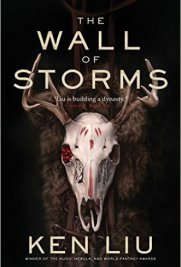 KL: I’ve been working on the copyedits of my second novel, The Wall of Storms, and I’m super excited to share this book with readers come October. There’s lots more intrigue and politics and crafty battle strategies and oodles of silkpunk technology. I literally dream about these machines some nights…
KL: I’ve been working on the copyedits of my second novel, The Wall of Storms, and I’m super excited to share this book with readers come October. There’s lots more intrigue and politics and crafty battle strategies and oodles of silkpunk technology. I literally dream about these machines some nights…
Okay, but more seriously, I have discovered the secret of time-turning, and I have a proof and a set of schematics that I’m excited to share. Okay, let me find it on my hard drive … Darn it, it is too lengthy to fit into the space allotted me here, and the pictures are too big to send through email. Next time?
Obligatory “If You Were a Butt, My Butt” Update: The fundraiser’s doing really well! And if we get to $600, Ken Liu will join authors Ann Leckie, Brooke Bolander, Juliette Wade, Alyssa Wong, and me, in writing a round robin story about dinosaurs. (I didn’t plan to run this interview to coincide with that; it just happened.)
May 18, 2016
LitBrick Comic Strip based on “If You Were a Dinosaur, My Love!”
Originally published at Rachel Swirsky. You can comment here or there.
Sometimes being an author is really cool. Such as this comic strip based on my story “If You Were a Dinosaur, My Love.”
Fan art! Yay!
The comic is called LitBrick: Sequential Comedies of Literature, I think it’s is a pretty neat idea: “The comic is an exploration (and a relentless send-up) of all the literature one might find in college. Lit Brick was initially founded upon the idea of reading the entire Norton Anthology of English Literature and making fun of it, but over the course of several years, the comic has taken a few forks in the road.”
John S. Troutman says the story “is a brilliant and heartbreaking short story, so of course I made really dumb Jurassic Park jokes about it. I feel like none of you should be surprised.”
…I’m not actually surprised by anything, I just wanted to put up a picture of a surprised dinosaur.
Obligatory Butts update:
We’re less than $30 from the next stretch goal! If we get there, I’ll add in “If You Were a Cuttlefish, My Love” which I wrote one night because I was amused, and cuttlefish are awesome. Let them be awesome in your life, too.
And if we get to the NEXT stretch goal after that, then there will be an original comic from the buoyant Liz Argall and her Things Without Arms and Without Legs… and Without Butts.
If you’re wondering what all this means — and/or about how and why I’m raising money through my Patreon for LGBTQIAA health care — lo, I give unto you the tale.
May 17, 2016
Cats in Hats
Originally published at Rachel Swirsky. You can comment here or there.
First there was the dog Oscar.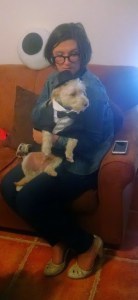
The dog Oscar had a costume including a tuxedo and hat. His owner says that depending on whether he wears that hat or not, sometimes it makes him look like a gentleman, and sometimes it makes him look like a gentleman hobo.
Then there was the hatting of the cats.
First, Pete, was convinced to wear the hat. Despite his skepticism, he did not view the hat as a threat. He is here pictured next to an iPad on which is playing the game To Be or Not to Be, the choose-your-own-adventure version of Hamlet designed by Ryan North.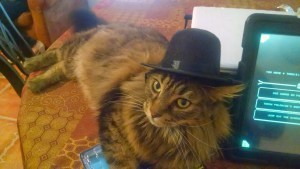
Next, there was Clone, whose love of humans overwhelms all. If a human is within 20 yards, he purrs like a truck. A hat is a small price to pay.
Then, Alexi, who accepted the hat along with some ear scratches. He did not seem to have noticed at all that there was a hat.
He did, however, drool.
Not pictured: two cats who expressed their lack of enthusiasm for headwear by running away really quickly.
Posteriors for Posterity: An update on my fundraiser for LGBTQ health
Originally published at Rachel Swirsky. You can comment here or there.
It’s halfway through my Making Lemons into Jokes campaign, and I wanted to give an update.
Among other things, I wanted to clarify why I’m doing this. For people in the know, the reasons are obvious–but obviously, most folks aren’t.
Let me start by repeating a modified version what I said in my original post:
In my family, humor has always been a way of putting crap into perspective. When life hands you lemons, make jokes. And then possibly lemonade, too. It is coming up on summer.
In that spirit, I’m trying a self-publishing experiment. And that experiment’s name is “If You Were a Butt, My Butt.”
If my Patreon reaches $100 by the end of the month [Note: it has!], I will write and send “If You Were a Butt, My Butt” to everyone who subscribes with at least $1.
I will be donating the first month’s Patreon funds to Lyon-Martin health services. Lyon-Martin is one of the only providers that focuses on caring for the LGBTQIAA community, especially low-income lesbian, bisexual, and trans people. They provide services regardless of the patient’s ability to pay.
You don’t have to keep on paying into my Patreon in order to participate! It’s just fine if you want to sign up, get your silly thing, and just support Lyon-Martin. I’ll send out a note after I release “If You Were a Butt, My Butt,” and remind folks to unsubscribe if they want to.
I also release a piece of original flash fiction or poetry to all my subscribers each month, so you’ll get June’s, too, along with the Butts, whether you keep on subscribing or not.
Humor can turn anything ridiculous. That’s part of its healing power. When that’s the aim, being mean-spirited or nasty defeats the point. I can’t promise I won’t make any metafictional jokes, but I’m not going to focus on it. The rare times I do, it will be silly.
That’s the plan! But I didn’t include the why of it all.
Short version: A bigot is using the Hugo Awards to harass me and LGBTQ people, so fuck him. Let’s follow the Scalzi strategy–and raise money for something he hates.
Long version: A few years ago, I wrote a short story called “If You Were a Dinosaur, My Love.” Sometimes stories take off, and this one did. I was honored by how many people it moved–people still come to me at conventions, and over social media, to tell me that the story was important to their lives.
“If You Were a Dinosaur, My Love” was nominated for the Hugo Award and the World Fantasy Award, and won the Nebula Award. For some folks in the science fiction world, this was cause for such a clash of sturm und drang that they aren’t over it years later. I admit I remain baffled as to why. There have been award winners throughout my life that I disliked for aesthetic or political reasons. The correct response–if you decide to respond at all (I usually don’t)–is talking about it, and mobilizing. It isn’t harassing authors.
Unfortunately, some of the folks who are in a snit have decided to go for the harassing. The white supremacist ring-leader has targeted minority writers before, including successful African American author N. K. Jemisin. He used our writers’ union’s resources to propagate his hateful, racial harassment, calling this accomplished writer a “half-savage” and implying she should be shot. The first, unmoderated comment on his post added that she should be gang raped as well.
I was one of the people on the union’s board at that time. So were other authors he has subsequently harassed, including John Scalzi and Ann Leckie. I am proud to have stood up for Nora against his harassment. But it put me on an enemy’s list–and here we are.
Although he and his followers are happy to use any excuse to harass me–anti-Semitism, sexism, fatphobia–mostly he’s gone after me and my readers for being queer. The bigoted rhetoric is especially nasty to trans people. And come on. Like they need more crap.
That’s where the Hugos come in. Since trolls gotta troll in order to justify their petty lives, they decided to troll the Hugo Awards. Want to know why? The same reason the neighborhood bully knocks over your Lego tower. They can’t figure out how to make one of their own. Using underhanded tactics, they nominated a “satire” of my work to the ballot, which the white supremacist posted on his own blog. As the publisher, he included a comment saying I should be killed. Sure, it’s phrased as a “joke.” But the dogs can hear the whistle.
Luckily, there’s a hilarious silver lining. Because he and his followers are the kind of juvenile people who assume “gay = porn” (apparently, the word “gay” causes them to compulsively think of gay sex, which must be alarming for a homophobe), they also nominated a piece of porn about a dude who has sex with dinosaurs. It’s called “Space Raptor Butt Invasion” and it’s hilarious because the story’s author, Chuck Tingle, is some sort of subversive, queer, meta-fictional performance artist. Remember when Stephen Colbert hosted the white house correspondence dinner because no one bothered to do their leg work? It’s like that.
It’s been a pleasure watching the trolls get trolled, but let’s be clear–there’s still harassment going on.
Fuck that.
I deserve better, and so does the LGBTQ community. Let’s be fun. Let’s be silly. And let’s raise some fucking money for poor queer people who deserve the same medical care as everyone else.
Would I also like people to support my Patreon? Sure. Real talk: I’m an author, and no matter what you’ve seen on Castle, most of us don’t make much dosh. My household is looking at a 50-66% reduction in income over the next year, so I need a hustle or two. I’ve built my career writing art house short stories. Perfectionism takes time! And when you’re doing freelance piecework, more time means less pay.
But you don’t have to support me at all. You can still have fun, participate in something silly, and send all your support to Lyon-Martin. They deserve your help!
So far, I’ve collected enough money to write “If You Were a Butt, My Butt” and make an audio version, too. I’m very close to reaching $300. Help me get there!
At $300, I’ll add another hundred dollars of my own to go to Lyon-Martin.
At $400, I’ll also release a silly version of “If You Were a Dinosaur, My Love” about cuttlefish. Because cuttlefish are bizarre and awesome. You know it to be true.
At $500, cartoonist Liz Argall — creator of the Things Without Arms and Without Legs — will do an original comic on the topic of butts. Check out her work here: http://www.thingswithout.com/
At $600, I and several other authors will write a short story together about dinosaurs. Authors to be named later — believe me, they’re awesome.
At $700, puppeteer, audio book narrator, and all around awesome person Mary Robinette Kowal will record the audio version of “If You Were a Butt, My Butt” in her professional studio–and she will be amazing. Here she is reading some tweets by John Scalzi. Erotically.
I don’t have a goal yet for $800. Make me come up with one!
I hope you’ll consider donating. Because hate in the world is the worst, but we can counter it by doing good in the world. And by remembering to laugh.
And with butts.

